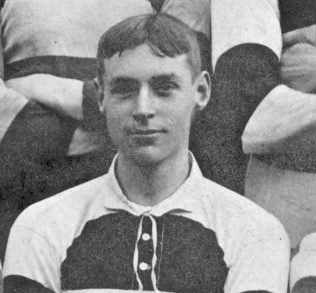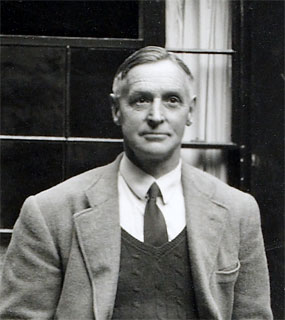Hudson, Arthur


Arthur Hudson was born at Gloucester in 1882, the son of an innkeeper. The family lived on Oxford Road, and Arthur found employment as a clerk for the Midland Railway. He started as a soccer player for Barnwood, and later for City Albion, who rented a pitch at Kingsholm.
In 1902 he switched to rugby and scored his first try for the Gloucester 2nd XV against Berkeley on 8th November 1902. He soon graduated to the 1st team, scoring two tries on his debut, a 14-11 win over Cheltenham at Kingsholm on 27th December 1902. He finished the season with twelve appearances and four tries.
The following season he displayed real pace either at centre or on the wing, and made his debut for Gloucestershire against Glamorgan at Cheltenham on 14th October 1903, but failed to secure a permanent place for Club or County. He really arrived in the 1904-05 season, formed a very successful pairing with Jimmy Harrison inside him at centre, and played in 31 of the Club’s 36 fixtures. Arthur ended up as the leading try scorer with a record-breaking 35, including seven against Broughton Park and six against United Services. He made his County Championship debut against Somerset.
Arthur scored two tries against Clifton in the first match of the 1905-06 season, and did not look back as he ran in six against Bream in the County Cup, and five each against Penylan and Hartlepool Old Boys, contributing to a new team record of 661 points, and setting a new individual record of 41 tries, which remains the best ever by a Gloucester player.
There was, however, a 0-44 loss to the All Blacks at Kingsholm – Arthur was knocked out early on, but returned for the second half. This wasn’t his only encounter with the All Blacks; he also played for Bedford against them, at Bedford on 15 November 1905, invited along with his Gloucester team-mate George Romans and some players from other clubs to help bolster their side. This was to no avail, as the All Blacks won 41-0.
Arthur became friends with the All Black wing, Duncan McGregor, who returned to Gloucester at the end of the tour and opened a sports outfitter shop, using Arthur’s name to promote it and employing Arthur’s sister to run it – McGregor returned to New Zealand a few years later, but the shop remained in the Hudson family for 114 years.
Arthur was selected for an England trial, but not for the final trial, so it was a surprise when he received an invitation to play against Wales at Richmond on 13th January 1906. He was “a distinct success and easily the best of the English three-quarters. He took the one chance that came his way in capital style, and went through the defence grandly,” but his try merely kept the loss to 3-16.
At this time Arthur weighed 12st 11lbs and was an inch short of 6ft, noted for “going for the line in no half-hearted fashion” and “a most awkward man to tackle” because of his high knee action. He was retained for the match against Ireland, but did not play against Scotland, before travelling to Paris for the first representative match between England and France on 22nd March 1906. Arthur scorched across the Parc de Princes, scoring four tries, as England won 35-6.
In November 1906, Arthur played for Gloucestershire against South Africa, who won 23-0. A disappointing season saw him playing at centre for Gloucester, with Harrison having turned professional. Arthur was a reserve for England versus Wales, but won no further caps.
In 1907-08, he scored 25 tries in 20 Club games, twice scoring five in a match, won four more caps for his County, and was reinstated in the England side for all four internationals, scoring two tries against Ireland.
Arthur was elected captain of Gloucester in the summer of 1908, a position he would retain for five seasons. Illness restricted him to 21 appearances in 1908-10, although he was able to play for the County against the touring Australians at Kingsholm in October 1908, when the tourists won 16-0.
During another fractured season in 1909-10, he played in two international trials at the newly built stadium at Twickenham, and came back into the England team in Paris in March 1910, scoring two tries in an 11-3 win. He was selected, but unable to play due to injury, in the final game of the season against Scotland, when England won the International Championship for the first time in 18 years, so his England record finished at eight caps and nine tries. He was restored to fitness for the 1910 County Championship final, when Yorkshire were defeated 23-0 at Kingsholm, with Arthur contributing two tries, for one of which, “Hudson had three men round him in the corner, but cleverly evading his opponents, he slipped over the line and scored a splendid try.”
Arthur was restored to full fitness for the 1910-11 season, and scored tries in each of the first four games of the season against Bream (3), Stroud (4), Cinderford (1) and Clifton (5) – he finished as the leading try scorer with 32 in 32 games. He made the trip to France to play in the Club’s famous 18-13 win in Toulouse, and captained the County against Somerset and Cornwall. 1911-12 was similar, with Arthur the leading try scorer with 23 from 31 appearances, another trip to France for the Club’s 13-3 victory over Stade Francais, and more caps in a disappointing County season.
Arthur’s career seemed to be in decline in 1912-13, when he was again plagued by injury, and although he remained as leading try scorer, it was with only 14 tries, and the County did without him. He stood down as captain, intimated that he would retire, and went on to the Club committee, but was persuaded to turn out a few times in 1913-14.
In the Great War he served on submarines, but also played rugby for Devonport Services, the Navy and the Combined Services, and brought naval sides to play at Kingsholm. During the war, Arthur married Ellen Phillips, and their son, Gordon, would follow his father as a leading Gloucester rugby player and administrator. Arthur was a keen tennis player, and his daughter, Gwen, played at Wimbledon.
In 1919, Arthur, now aged 36, resumed his playing career for a wonderful swan song of a final season. For the Club he made 26 appearances and was leading try-scorer with 17. He finished his try-scoring with a hat trick against Cheltenham on 6th April 1920, and his final Club game was four days later – a 3-0 victory over Swansea at Kingsholm. The Citizen summarised: “Hudson’s form has simply been wonderful – he retained his keenness, dash and scoring ability and no player was more feared by opponents”. In a career which spanned 18 years, Arthur played 268 matches for Gloucester and scored 242 tries.
A week after his last appearance for Gloucester, Arthur captained his County in the Championship Final against Yorkshire at Bradford. He dislocated his shoulder, and this injury ended his career, but Gloucestershire triumphed 27-3. He finished with 30 County caps and 14 tries. Dai Gent, who played alongside Arthur at all levels, wrote: “a wing who has thrilled me – a splendid example of a man using his excellent physique to the best advantage, without too much finesse”.
In 1920, Arthur was appointed secretary of the Gloucester Club, and remained in post for 42 years, doubling up as treasurer and fixture secretary for many years. He was also a director of the Ground Company which owned Kingsholm, and safeguarded the Club’s interests when the authorities took over the ground during the Second World War. For this, the Club wished to reward him with an honorarium, but Arthur insisted that the money be used to start a fund to purchase a ground for local rugby clubs, which resulted in the Memorial Ground on Tuffley Avenue. Arthur died in 1973, aged 91.





Comments about this page
No problem. Thanks very much. I don’t think Eastern Counties have ever played the All Blacks; and they used to play at Grange Road, Cambridge. Bedford were/are in the East Midlands Union.
Nigel – we are certain that you are correct and we’ve now updated our entry – thanks very much.
The only reference we can now find to a New Zealand match in 1905 against Eastern Counties is in a mis-labelled entry relating to a photo which was in fact of a “Midlands Counties” (Leicester) match.
See https://www.alamy.com/stock-photo-eastern-counties-v-new-zealand-1905-photo-spread-of-the-original-all-17621750.html
Thanks very much, Nigel – this is interesting, and I’ll pass it on to our researchers immediately. It’s always very helpful if we can continue to refine our knowledge. I’ll post our response just as soon as I hear back from them.
This is a really good site, I wish other Clubs would do the same. However, there is a minor inaccuracy in the profile of Arthur Hudson regarding his second appearance against the 1905 All Blacks. The team he (and George Romans) played for was Bedford, or at least was supposed to be Bedford, and not the Eastern Counties.
Like everyone else Bedford were dismayed by the magnitude of NZ’s early tour victories and things were made worse by the fact that Bedford were having a poor season. They suffered a record defeat early in the season (8-39 vs Cambridge University) and that was later broken later (5-52 vs Gloucester).
So worried were Bedford that they started borrowing players for the New Zealand fixture. They had two from Blackheath including the Ireland captain Basil Maclear, three from Northampton including future England captain Edgar Mobbs, and two from Gloucester, Hudson and Romans. So basically half the Bedford team were actually players from other clubs.
New Zealand were not impressed. The Bedford match was in the midweek before the First Test against Scotland, and they were forced to put out a stronger team against Bedford’s invitational team than they’d originally expected. The All Blacks won 41-0.
Although Bedford continue to claim the match as an authentic club fixture, it is officially recorded as New Zealand v a Bedford XV and not Bedford RUFC.
My grandfather, Ern Hall, played as a 3/4 alongside Arthur in the 1905/6 record scoring Gloucester team and during Arthur’s record try scoring season 1904/05. My uncle (now 93) recalls Ern saying that although Arthur got the tries – ‘who gave him the ball?’! Ern also managed 13 tries in 04/05 and 20 tries in 05/06 – they must have been a joy to watch. My father, Ern junior (now 92) recalls meeting Arthur when Arthur ran his outfitters in Gloucester.
Add a comment about this page